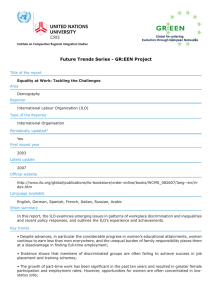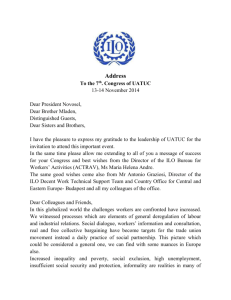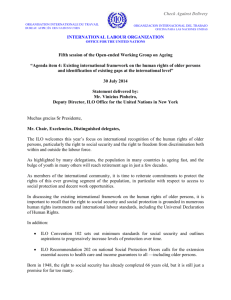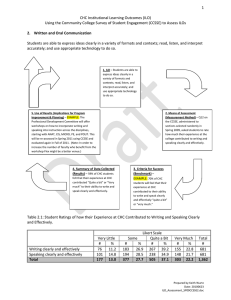1 CHC Institutional Learning Outcomes Fall 2010 ILO Assessment Plan Assessing Critical Thinking and Society and Culture
advertisement
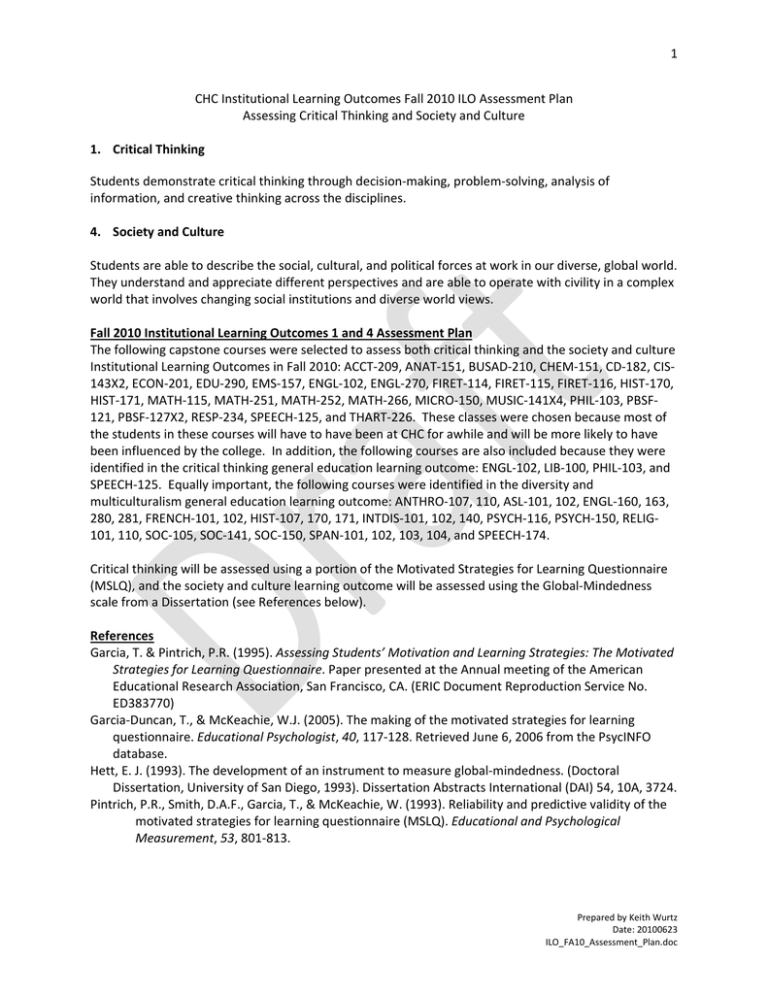
1 CHC Institutional Learning Outcomes Fall 2010 ILO Assessment Plan Assessing Critical Thinking and Society and Culture 1. Critical Thinking Students demonstrate critical thinking through decision‐making, problem‐solving, analysis of information, and creative thinking across the disciplines. 4. Society and Culture Students are able to describe the social, cultural, and political forces at work in our diverse, global world. They understand and appreciate different perspectives and are able to operate with civility in a complex world that involves changing social institutions and diverse world views. Fall 2010 Institutional Learning Outcomes 1 and 4 Assessment Plan The following capstone courses were selected to assess both critical thinking and the society and culture Institutional Learning Outcomes in Fall 2010: ACCT‐209, ANAT‐151, BUSAD‐210, CHEM‐151, CD‐182, CIS‐ 143X2, ECON‐201, EDU‐290, EMS‐157, ENGL‐102, ENGL‐270, FIRET‐114, FIRET‐115, FIRET‐116, HIST‐170, HIST‐171, MATH‐115, MATH‐251, MATH‐252, MATH‐266, MICRO‐150, MUSIC‐141X4, PHIL‐103, PBSF‐ 121, PBSF‐127X2, RESP‐234, SPEECH‐125, and THART‐226. These classes were chosen because most of the students in these courses will have to have been at CHC for awhile and will be more likely to have been influenced by the college. In addition, the following courses are also included because they were identified in the critical thinking general education learning outcome: ENGL‐102, LIB‐100, PHIL‐103, and SPEECH‐125. Equally important, the following courses were identified in the diversity and multiculturalism general education learning outcome: ANTHRO‐107, 110, ASL‐101, 102, ENGL‐160, 163, 280, 281, FRENCH‐101, 102, HIST‐107, 170, 171, INTDIS‐101, 102, 140, PSYCH‐116, PSYCH‐150, RELIG‐ 101, 110, SOC‐105, SOC‐141, SOC‐150, SPAN‐101, 102, 103, 104, and SPEECH‐174. Critical thinking will be assessed using a portion of the Motivated Strategies for Learning Questionnaire (MSLQ), and the society and culture learning outcome will be assessed using the Global‐Mindedness scale from a Dissertation (see References below). References Garcia, T. & Pintrich, P.R. (1995). Assessing Students’ Motivation and Learning Strategies: The Motivated Strategies for Learning Questionnaire. Paper presented at the Annual meeting of the American Educational Research Association, San Francisco, CA. (ERIC Document Reproduction Service No. ED383770) Garcia‐Duncan, T., & McKeachie, W.J. (2005). The making of the motivated strategies for learning questionnaire. Educational Psychologist, 40, 117‐128. Retrieved June 6, 2006 from the PsycINFO database. Hett, E. J. (1993). The development of an instrument to measure global‐mindedness. (Doctoral Dissertation, University of San Diego, 1993). Dissertation Abstracts International (DAI) 54, 10A, 3724. Pintrich, P.R., Smith, D.A.F., Garcia, T., & McKeachie, W. (1993). Reliability and predictive validity of the motivated strategies for learning questionnaire (MSLQ). Educational and Psychological Measurement, 53, 801‐813. Prepared by Keith Wurtz Date: 20100623 ILO_FA10_Assessment_Plan.doc 2 1. Critical Thinking Students demonstrate critical thinking through decision‐making, problem‐solving, analysis of information, and creative thinking across the disciplines. 1. ILO – Students demonstrate critical thinking through decision‐making, problem‐solving, analysis of information, and creative thinking across the disciplines. 2. Means of Assessment (Measurement Method) – The CT and SC assessment will be administered in the first two weeks in November, Fall 2010, in the capstone courses identified by the ILO committee and in the appropriate GE courses. 5. Use of Results (Implications for Program Improvement & Planning) – The Outcomes Assessment Committee will discuss and identify implications for improvement.) 4. Summary of Data Collected (Results) – (Results will be provided by the ORP.) 3. Criteria for Success (Benchmark) – (The Outcomes Assessment Committee will set a benchmark.) Prepared by Keith Wurtz Date: 20100623 ILO_FA10_Assessment_Plan.doc 3 4. Society and Culture Students are able to describe the social, cultural, and political forces at work in our diverse, global world. They understand and appreciate different perspectives and are able to operate with civility in a complex world that involves changing social institutions and diverse world views. 1. ILO – Students are able to describe the social, cultural, and political forces at work in our diverse, global world. They understand and appreciate different perspectives and are able to operate with civility in a complex world that involves changing social institutions and diverse world views. 2. Means of Assessment (Measurement Method) – The CT and SC assessment will be administered in the first two weeks in November, Fall 2010, in the capstone courses identified by the ILO committee and in the appropriate GE courses. 5. Use of Results (Implications for Program Improvement & Planning) – The Outcomes Assessment Committee will discuss and identify implications for improvement.) 4. Summary of Data Collected (Results) – (Results will be provided by the ORP.) 3. Criteria for Success (Benchmark) – (The Outcomes Assessment Committee will set a benchmark.) Prepared by Keith Wurtz Date: 20100623 ILO_FA10_Assessment_Plan.doc 4 Crafton Hills College (CHC) - ILO Assessment Dear Student, CHC needs your help. As part of Crafton's learning outcomes initiative, the college is currently collecting data to evaluate some of its Institutional Learning Outcomes. Please answer the following questions as best you can. Your answers will remain confidential. When you have finished the survey, please return it to your instructor. If you have any questions about this survey, please contact CHC's Instructional Assessment Specialist, Dr. Gary Williams at 909-389-3567. Student's Last Name Student ID Number Course Section The following questions ask about your attitudes. Remember there are no right or wrong answers, just answer as accurately as possible. Use the scale to answer the questions. If you think the statement is very true of you, choose 7; if a statement is not at all true of you, choose 1. If the statement is more or less true of you, find the number between 1 and 7 that best describes you. Not at all true of me 1 I often find myself questioning things I hear or read to decide if I find them j k l m n convincing. (CT) I feel a strong kinship with the worldwide j k l m n human family. (SC) I treat new material as a starting point and j k l m try to develop my own ideas about it. (CT) n It is not really important to me to consider myself as a member of the global j k l m n community. (SC) I try to play around with ideas of my own j k l m n related to what I am learning. (CT) In the long run, Americans will probably benefit from the fact that the world is j k l m n becoming more interconnected. (SC) Whenever I read or hear an assertion or conclusion, I think about possible j k l m n alternatives. (CT) I think of myself, not only as a citizen of my country, but also as a citizen of the j k l m n world. (SC) I often think about the kind of world we are j k l m n creating for future generations. (SC) When a theory, interpretation, or conclusion is presented to me, I try to j k l m n decide if there is good supporting evidence. (CT) 2 3 4 5 6 Very true of me 7 j k l m n j k l m n j k l m n j k l m n j k l m n j k l m n j k l m n j k l m n j k l m n j k l m n j k l m n j k l m n j k l m n j k l m n j k l m n j k l m n j k l m n j k l m n j k l m n j k l m n j k l m n j k l m n j k l m n j k l m n j k l m n j k l m n j k l m n j k l m n j k l m n j k l m n j k l m n j k l m n j k l m n j k l m n j k l m n j k l m n j k l m n j k l m n j k l m n j k l m n j k l m n j k l m n j k l m n j k l m n j k l m n j k l m n j k l m n j k l m n j k l m n j k l m n j k l m n j k l m n j k l m n j k l m n j k l m n j k l m n j k l m n j k l m n j k l m n j k l m n Thank you, please return the survey to your instructor! Prepared by Keith Wurtz Date: 20100623 ILO_FA10_Assessment_Plan.doc
